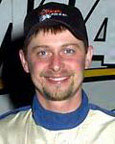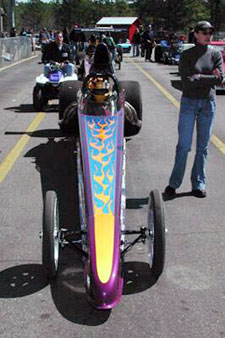THE LAST MODIFIED CHAMP
By Ian Tocher
Photos courtesy of Seward Racing
His parents' first date came at a dragstrip, so it wasn't all that
surprising for Brian Seward to grow up and become a championship-winning
drag racer himself. After scoring three event wins, two runners-up,
and a quarter-final appearance in 2002, Seward earned the IHRA's Hooker
Modified title -- a historically significant feat since the sanctioning
body decided to cancel the class, effective at season's end.
 That
decision, the new champ says, helped form his plans for 2003.
That
decision, the new champ says, helped form his plans for 2003.
"Unless they resurrect the class at some point, I'll go down as the last IHRA Modified champion, and that's kind of bittersweet. I can go to all the IHRA races I want for free next year, but I probably won't be going to any of them. They don't have any classes that I care to run; I'm not interested in running any electronics classes. My goal has always been to work toward the heads-up type racing, so I'm going to go run NHRA Comp Eliminator.
"That's probably not what IHRA wants to hear, but they left me no choice," Seward says. "I don't necessarily blame them for canceling the class; the car counts weren't that great, probably averaging about 25 cars a race [for a 32-car field]. There were occasions where there were only 15 or 16 cars and sometimes there were 40 or 45 cars, but it all comes down to what region of the country you were in.
Seward blames the establishment of five divisions and IHRA's distribution of
national events "all over the countryside" for diluting the Modified
field. He points out there always was a large collection of Modified
racers in the Midwest, with another strong base in the Southeast,
but claims the Northeast - where IHRA holds races in New Hampshire
and Maryland -- has traditionally produced a limited number of eligible
cars.
 Seward,
31, grew up in Middletown, IN, and says he became interested in racing
"pretty much the day I was born." He recalls growing up in the pits
and staging lanes of Muncie Dragway, where his father, Bruce, was
a longtime Super Stock and bracket racer. "We did that all my life
until I started driving when I was 17. It was a rear-engined dragster;
that's all I've ever driven" -- but not because he wouldn't like to
drive a doorslammer someday -- "I've just always liked going fast
and it's a whole lot cheaper to go fast in a dragster."
Seward,
31, grew up in Middletown, IN, and says he became interested in racing
"pretty much the day I was born." He recalls growing up in the pits
and staging lanes of Muncie Dragway, where his father, Bruce, was
a longtime Super Stock and bracket racer. "We did that all my life
until I started driving when I was 17. It was a rear-engined dragster;
that's all I've ever driven" -- but not because he wouldn't like to
drive a doorslammer someday -- "I've just always liked going fast
and it's a whole lot cheaper to go fast in a dragster."
When his racing career temporarily put on hold for five years while he earned a degree in mechanical engineering from Purdue University, Seward still found time to work part-time as a crewmember on Danny Townsend's NHRA Alcohol Funny Car team. After graduating, he worked the next five years as a manufacturing engineer at Borg-Warner before gradually working into the sales side of the business. Now, as a sales rep for William Bruce Purtlebaugh Co., a machinery supplier representing eight companies to major automotive plants in Indiana, Seward says, "I kind of call on the people who have the same job I used to have."
After a brief stint in motocross racing -- "I finally got smart after getting hurt too much" -- Seward returned to drag racing part-time in 2001 after building an engine with the help of close friend and 2001 Modified champion Mike Lyons. It was a successful effort, with Seward winning the national event at Norwalk, then at Budd's Creek, MD, resetting the national class E.T. record to 7.15 seconds. "We had a lot of fun last year, but didn't race a whole lot," he says.
Ironically, prior experience in NHRA Comp Eliminator actually led
Seward to join IHRA's Modified ranks. "That kind of heads-up racing
was my true dream, and Modified was sort of the poor man's Comp,"
he explains. "You get to run Comp Eliminator-style cars; you get the
weight breaks; you still get to run heads up sometimes; but for the
most part, you bracket race. For the money I had, it was the closest
I could get to heads-up racing."